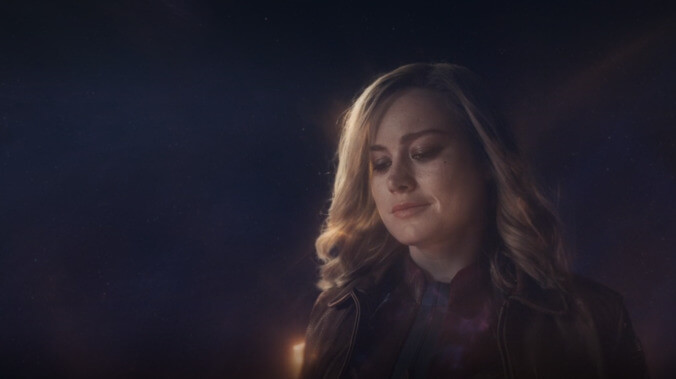How Secret Invasion gives new meaning to the end of Captain Marvel
Captain Marvel changed what we know about classic Marvel villains. Now Secret Invasion might change what we know about a Marvel hero

Marvel’s Secret Invasion is here, and with it comes a number of new and interesting revelations about the current state of Earth in the Marvel Cinematic Universe. Nick Fury is back, looking a little older and a little more rundown after taking the last few years off so he could go on an extended space vacation (as seen in Spider-Man: Far From Home). But, more importantly, there are now a number of aliens running around with the ability to perfectly disguise themselves as humans … and not all of them are nice about it.
The aliens are called Skrulls, and when they’re not in disguise they have green skin, big chins, and long ears. The last time we saw a bunch of them in the MCU was Captain Marvel, where they were first introduced as the ostensible heartless villains of a space war. That’s how they’ve been historically depicted in Marvel comics as well, as the sort of bad guys that it’s okay to fight because they’re bad guys (see also: Hydra, AIM, The Hand, etc.), but Captain Marvel ultimately reversed that canon by showing that the Skrulls are actually misunderstood refugees who have been endlessly pursued throughout the galaxy by the fascist Kree.
Not the only Skrull in town
At the end of the movie, which was set in the ’90s, before most of the other MCU movies, Nick Fury and Carol Danvers come up with a plan to ferry a group of Skrulls through space in hopes of finding them a new homeworld after their original planet was obliterated by the Kree—explaining why Carol wasn’t around for the attack on New York in The Avengers or any of the other big incidents that could’ve used a mega-powerful superhero like Captain Marvel.
But in Far From Home, the leader of those Skrulls—Ben Mendelsohn’s Talos—is back on Earth, and apparently has been for quite some time. He’s still on Earth when Secret Invasion begins, and he’s clearly not the only Skrull still in town. In fact, a number of the Skrulls that Fury and Carol were supposed to find a home for are still on Earth, and they’ve become increasingly disaffected and radicalized against Talos and Fury. Some are even working with a terrorist faction that is trying to both destabilize the global political order and personally stick it to Nick Fury, so clearly they’re pissed at him and blame him for his failure.
So what happened to that whole “find them a new home” plan? We don’t really know what Carol was up to in between leaving Earth at the end of her movie in the ’90s and returning in the beginning of Avengers: Endgame (2023, give or take), but clearly that plan didn’t work out. Secret Invasion will explore this as it goes on, but as it stands now, the end of Captain Marvel isn’t quite the triumphant victory that it seemed to be at the time.
What was Carol doing for all that time? The Marvels probably won’t answer that question, since it takes place in the contemporary MCU and it has two other Marvels to deal with in addition to Carol. Besides, the more pressing question—especially for the purposes of Secret Invasion—might be: What was Nick Fury doing all this time?
Because not only did he not recognize when Hydra took over the U.S. government in Captain America: The Winter Soldier, but at least some of the Skrulls he was supposed to relocate didn’t end up relocating at all. The first episode of Secret Invasion made a point to keep saying that Nick Fury isn’t the man he used to be, but taken in context with the larger MCU, maybe he never really was the man he used to be?
A chance to end the MCU fatigue
Questions like that reflect a power that the MCU has that it taps into far too rarely. Secret Invasion doesn’t just have a bigger impact because viewers know Samuel L. Jackson’s Nick Fury and they’ve seen him in movies for 15 years, it has a bigger impact because we know what Fury has done over the course of those 15 years and we can now see that his actions (or maybe inactions) have repercussions on the larger universe.
That is a much more interesting narrative angle than simply “let’s check in on our superhero movie friends” and Secret Invasion could break the recent trend of MCU fatigue if it can actually do something worthwhile with how it answers those questions and give viewers an actual reason to care about why this story is being told beyond perpetuating the existence of the MCU.
A good cinematic universe isn’t good because it goes on forever and requires you to do homework or because it can throw wall-to-wall fan service at you, it’s good because it lets its stories breathe and grow as they connect to other stories that have breathed and grown. Secret Invasion has an opportunity to do be interesting, and that’s an opportunity that these kinds of superhero stories don’t always take advantage of.